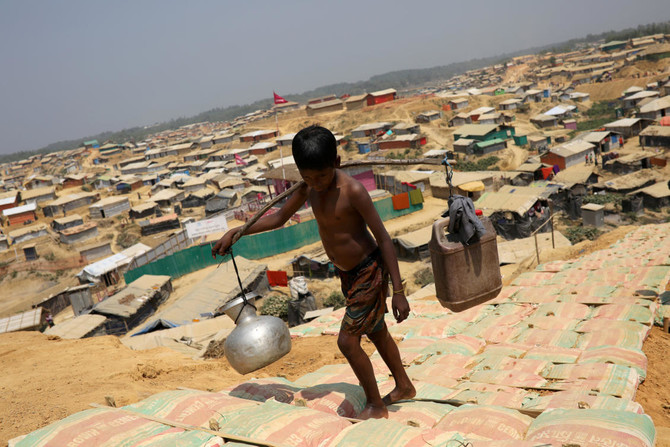DHAKA: Bangladesh’s government is finalizing a list of 10,000 Rohingya refugees whom it wants repatriated to Myanmar.
The list will be given to Myanmar for verification during the next Joint Working Group meeting scheduled in Dhaka at the end of April.
“To facilitate the repatriation, we are building two transit centers at Teknaf in Cox’s Bazar district and Ghumdhum in Bandarban district,” said Abul Kalam, commissioner of the Refugee Relief and Repatriation Commission.
“We hope to complete these centers in the next two months,” he said, adding that he was unsure when the repatriation process will start.
Bangladesh had earlier submitted a list of around 8,000 Rohingya to Myanmar, which verified only 600 of them as inhabitants of Rakhine state.
“Given the recent happenings in Myanmar, I don’t see any prospect of immediate repatriation,” Hamayun Kabir, former Bangladeshi ambassador to the US, told Arab News.
Myanmar is “building new camps with small rooms to keep the Rohingya families who’ll be repatriated. These camps are surrounded by a strong fence guarded round-the-clock by the military. They’ve kept more than 100,000 Rohingya this way since 2016. So the refugees won’t be interested to go back to Myanmar to live a confined life in camps,” he added.
“Bangladesh is in a dilemma. If we don’t provide lists according to the deal signed with Myanmar, we’ll be accused of not cooperating in the repatriation process. But when we do, Myanmar isn’t moving according to the desired pace,” Kabir said.
“We don’t have many options except for solving the problem through dialogue and diplomacy.”
Imtiaj Ahmed, professor of international relations at Dhaka University, told Arab News: “The most important question here is the citizenship rights of the repatriated Rohingya.”
Ahmed, an expert on regional conflicts, said: “We need to mount more pressure on Myanmar in international forums.”
He added: “The UN has already declared that Myanmar’s law-enforcement agencies committed genocide in Rakhine. If the international community also mounts pressure on Myanmar, it will eventually be compelled to take back the Rohingya and give them their due rights.”
To ensure the voluntary return of Rohingya refugees, Bangladesh’s government will engage the UN High Commissioner for Refugees (UNHCR) in the repatriation process, for which a memorandum of understanding will be signed shortly, said a Foreign Ministry source on condition of anonymity.
Bangladesh government finalizing list of 10,000 Rohingya for repatriation to Myanmar
Bangladesh government finalizing list of 10,000 Rohingya for repatriation to Myanmar














